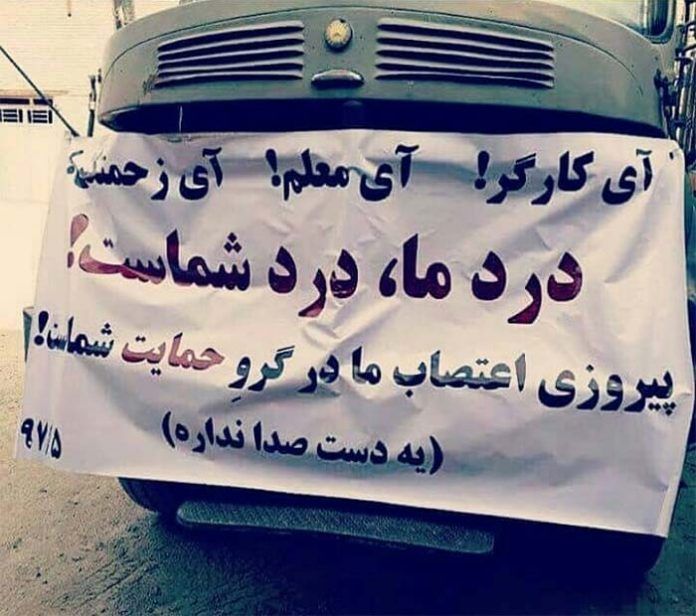
By Kayhan Life Staff
A strike by Iranian oil workers has entered its second week. Many workers on fixed-term and permanent contracts in other industries and businesses have also joined the industrial action. Tank truck drivers that provide fuel to refineries are also participating in the industrial action. As a result, many gas stations around the country have been experiencing a fuel shortage.
Iranian Oil Minister Bijan Namdar Zanganeh has described the striking contract workers’ demand as “extrajudicial,” arguing that their wages and work conditions are in line with the labor laws.
The nationwide strike by Iranian oil workers on fixed-term contracts — which started a day after the June 18 Iranian presidential elections — has now spread to at least 67 oil, gas, and petrochemical companies in at least seven provinces. It is the most extensive industrial action to date by the country’s oil workers.
Teachers, pensioners, and families who seek justice for their loved ones killed during the nationwide protests in November 2019 have now joined some 10,000 striking workers nationwide.
The protesters have also received support from domestic and international trade unions, including “The Free Union of Iranian Workers (FUIW),” “The Iranian Retirees Council,” and the Industrial Workers of the World (IWW), an international labor union representing some 50 million workers in automobile manufacturing and steel, oil, gas, and petrochemical industries worldwide.
Iranian Workers Stage Nationwide Strike; More than 60 Companies Are Impacted
At the beginning of spring, oil workers on permanent contracts staged a protest warning that they would strike on June 30 if their salaries were not raised to the same level as other government employees.
More workers on fixed-term and permanent contracts in refineries, petrochemical facilities, and other businesses, including Diar Automobile Company, Ramin Power Plant in the city of Ahvaz, and Shiraz Refinery, joined the strike action on June 28.
A video posted on social media reportedly shows striking truck drivers at Isfahan Refinery, refusing to transport fuel, resulting in a petrol shortage at many gas stations.
Homayoun Salehi, the Iranian Gas Station Owners Union chairperson, confirmed that tank truck drivers had gone on strike, saying that the shipping and transport fleet was facing a problem. He warned the problem would only worsen, given the low income of drivers and gas station operators.
According to Mr. Salehi, the rental cost of tank trucks is much lower than regular trucks or vehicle trailers. The union has been advocating higher wages for tank truck drivers with little success. As a result, many businesses prefer to transport their fuel with unpowered vehicle trailers or other types of transport that cost less.
Other unions are likely to join the industrial strike action, given the dire economic situation in the country.
On June 27, the Energy Committee of the Majlis (Iranian Parliament) held an emergency meeting with senior officials at the Oil Ministry, the Planning and Budget Organization, and the General Inspection Office to discuss recent events. However, instead of addressing the striking workers’ demands, the committee only reviewed issues raised by oil workers on permanent contracts.
Speaking to reporters after the meeting, Oil Minister Zanganeh said wages and work conditions for fixed-term contract workers in the oil industry were in line with the Ministry of Labor and Social Affairs’ laws. However, Mr. Zanganeh argued the issues raised by the contract workers were not part of the ministry’s responsibility, adding that the workers’ demands for higher wages and better work conditions were “extrajudicial.”
The oil minister described workers’ rightful demands as “extrajudicial.”
Dr. Mostafa Nakhaei, the Majlis’ Energy Committee chairperson, who was also at the meeting, said the committee would address issues raised about the salaries of permanent workers in the oil industry, adding that “the committee will submit a double-urgency proposal to resolve the issue.”
“Those at the meeting agreed to draft a proposal, enabling the Supreme Economic Coordination Council to address the salaries and wages of the oil industry workers on a permanent contract,” Dr. Nakhaei explained. “The council must ratify the proposal before forwarding it to the Oil Ministry, which will hopefully resolve the problems facing its employees.”
“These are justified grievances by workers and experts who helped the oil industry under hard conditions caused by sanctions and did not allow this industry, which is the backbone of our economy, to collapse. Instead, they have been thorns in the side of our enemy.” Dr. Nakhaei added. “Most of these employees did not benefit from the 25 percent salary increase. On the contrary, many of them received salary raises that fell well below 25 percent. Some even saw their salaries reduced.”
Dr. Nakhaei did not address the grievances of oil workers on fixed-term contracts.







